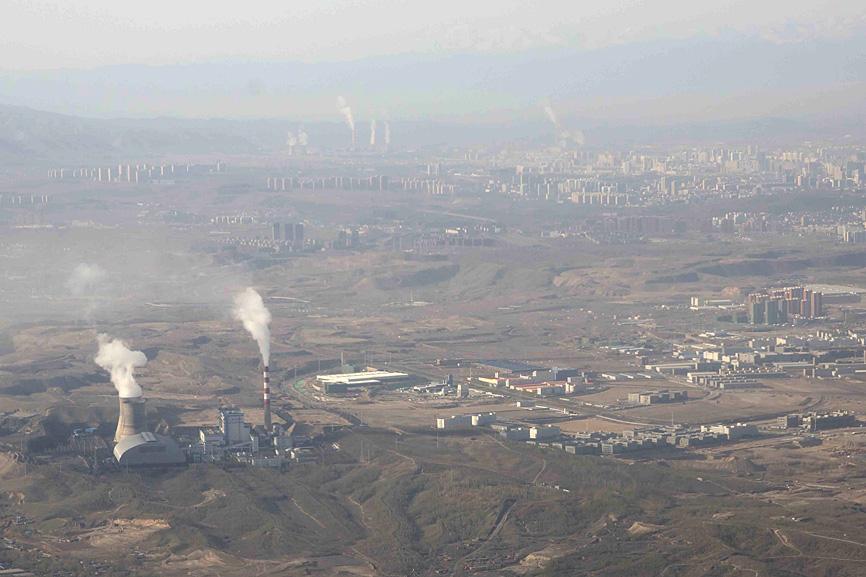China is promoting coal-fired power as the Chinese Communist Party (CCP) tries to revive a sluggish economy, prompting warnings that Beijing is setting back efforts to cut climate-changing carbon emissions from the biggest global source.
Official plans call for boosting coal production capacity by 300 million tonnes this year, news reports have said.
That is equal to 7 percent of last year’s output of 4.1 billion tonnes, which was an increase of 5.7 percent from 2020.

Photo: AP
China is one of the biggest investors in wind and solar, but jittery leaders called for more coal-fired power after economic growth plunged last year and shortages caused blackouts and factory shutdowns. Russia’s invasion of Ukraine added to anxiety that foreign oil and coal supplies might be disrupted.
“This mentality of ensuring energy security has become dominant, trumping carbon neutrality,” said Li Shuo (李碩), a senior global policy adviser for Greenpeace. “We are moving into a relatively unfavorable time period for climate action in China.”
Officials are facing political pressure to ensure stability as Chinese President Xi Jinping (習近平) is preparing to try to break with tradition and award himself a third five-year term as CCP leader in the autumn.
Coal is important for “energy security,” Cabinet officials said at a meeting on Wednesday, where they approved plans to expand production capacity, business news magazine Caixin reported.
The CCP is also building power plants to inject money into the economy and revive growth that sank to 4 percent in the final quarter of last year, down from the full year’s 8.1 percent expansion.
The CCP has rejected binding emissions commitments, citing its economic development needs, and Beijing has avoided joining governments that promised to phase out use of coal-fired power.
In a 2020 speech to the UN, Xi said China’s carbon emissions would peak by 2030, but he announced no target for the amount.
China aims for carbon neutrality by 2060, Xi said.
China accounts for 26.1 percent of global emissions, more than double the US’ share of 12.8 percent, the World Resources Institute has said.
China emits more than all developed economies combined, research firm Rhodium Group has said.
China’s goal of carbon neutrality by 2060 appears to be on track, but using more coal “could jeopardize this, or at least slow it down and make it more costly,” Clare Perry, ocean and climate campaign leader at the Environmental Investigations Agency said in an e-mail.
Promoting coal would make emissions “much higher than they need to be” by the 2030 peak year, Perry said. “This move runs entirely counter to the science.”

ENDEAVOR MANTA: The ship is programmed to automatically return to its designated home port and would self-destruct if seized by another party The Endeavor Manta, Taiwan’s first military-specification uncrewed surface vehicle (USV) tailor-made to operate in the Taiwan Strait in a bid to bolster the nation’s asymmetric combat capabilities made its first appearance at Kaohsiung’s Singda Harbor yesterday. Taking inspiration from Ukraine’s navy, which is using USVs to force Russia’s Black Sea fleet to take shelter within its own ports, CSBC Taiwan (台灣國際造船) established a research and development unit on USVs last year, CSBC chairman Huang Cheng-hung (黃正弘) said. With the exception of the satellite guidance system and the outboard motors — which were purchased from foreign companies that were not affiliated with Chinese-funded

PERMIT REVOKED: The influencer at a news conference said the National Immigration Agency was infringing on human rights and persecuting Chinese spouses Chinese influencer “Yaya in Taiwan” (亞亞在台灣) yesterday evening voluntarily left Taiwan, despite saying yesterday morning that she had “no intention” of leaving after her residence permit was revoked over her comments on Taiwan being “unified” with China by military force. The Ministry of the Interior yesterday had said that it could forcibly deport the influencer at midnight, but was considering taking a more flexible approach and beginning procedures this morning. The influencer, whose given name is Liu Zhenya (劉振亞), departed on a 8:45pm flight from Taipei International Airport (Songshan airport) to Fuzhou, China. Liu held a news conference at the airport at 7pm,

GRIDLOCK: The National Fire Agency’s Special Search and Rescue team is on standby to travel to the countries to help out with the rescue effort A powerful earthquake rocked Myanmar and neighboring Thailand yesterday, killing at least three people in Bangkok and burying dozens when a high-rise building under construction collapsed. Footage shared on social media from Myanmar’s second-largest city showed widespread destruction, raising fears that many were trapped under the rubble or killed. The magnitude 7.7 earthquake, with an epicenter near Mandalay in Myanmar, struck at midday and was followed by a strong magnitude 6.4 aftershock. The extent of death, injury and destruction — especially in Myanmar, which is embroiled in a civil war and where information is tightly controlled at the best of times —

Taiwan was ranked the fourth-safest country in the world with a score of 82.9, trailing only Andorra, the United Arab Emirates and Qatar in Numbeo’s Safety Index by Country report. Taiwan’s score improved by 0.1 points compared with last year’s mid-year report, which had Taiwan fourth with a score of 82.8. However, both scores were lower than in last year’s first review, when Taiwan scored 83.3, and are a long way from when Taiwan was named the second-safest country in the world in 2021, scoring 84.8. Taiwan ranked higher than Singapore in ninth with a score of 77.4 and Japan in 10th with